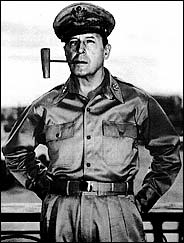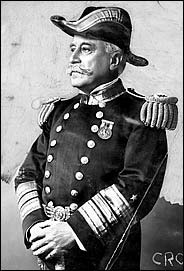

 |
| Associated Press |
| Gen. Douglas MacArthur faded away. |
 |
| Admiral Dewey: a one-day candidate. |
WASHINGTON — Those who hope, or fear, that the title "general" will catapult Wesley K. Clark into the White House might want to look up Adm. George Dewey, whose defense of the American occupation of the Philippines made him the media darling of his time.
On April 3, 1900, with the public clamoring for him to run for president, a newspaper reporter knocked on the admiral's door. Dewey invited him in and declared his candidacy, saying, "I am convinced that the office of the president is not such a very difficult one to fill."
That was the beginning and the end of Dewey's presidential prospects. Today he is a footnote in the annals of American politics. He is hardly the only soldier to find himself there. For all the comparisons to Dwight D. Eisenhower that General Clark's entry into the presidential race has evoked, history is littered with the failed presidential bids of military men.
Gen. Winfield Scott, the hero of the Mexican War of 1846, lost to Franklin Pierce in 1852. In a sense, he lost twice; in 1880 the Civil War hero Gen. Winfield Scott Hancock, who was named after the first General Scott, lost to another Civil War campaigner, James A. Garfield.
Gen. Douglas MacArthur hoped to run for the presidency after President Harry S. Truman relieved him of commanding the American-led coalition fighting in Korea in 1951. But despite his fame as a soldier, his bid for the White House ended before it began. George S. McGovern had a brilliant record as a bomber pilot in World War II. Robert J. Dole and John McCain rode their dramatic war biographies to the United States Senate. But none of them became commander-in-chief.
"There is a whole tradition of the importance of military service and military heroics in American politics," said James MacGregor Burns, a historian at the University of Richmond. "It can be helpful, but I don't think it's decisive anymore."
Before there were sports heroes or Hollywood heroes, there were war heroes, and Americans have been enchanted with soldiers since the birth of the nation.
"It's the aura of heroism, the idea that this is someone who is prepared to sacrifice, someone who has demonstrated bravery," said Ross K. Baker, a political scientist at Rutgers University. "Those are qualities that are esteemed by Americans, and these qualities can be transferred to politics."
George Washington understood that, and assiduously avoided flaunting his Revolutionary War credentials, in part, historians say, to ensure that the presidency was not dominated by a succession of soldiers.
"He regarded Cincinnatus as his model," said the historian Arthur Schlesinger Jr. "Cincinnatus saved Rome, then retired to his farm."
Washington, though, is an exception; rare is the politician who does not try to use military service to his advantage. One would-be presidential candidate, Lyndon Baines Johnson, went so far as to drum up what the historian Robert Dallek called "a kind of ersatz military career." In 1941, while a member of the House of Representatives, Johnson took leave to join the Navy for six months, installing his wife, Lady Bird, as his congressional surrogate. He went into combat and was awarded a Silver Star.
But the medal was of little use to Johnson when he ran against John F. Kennedy, who, as a dashing young Navy captain, survived a Japanese attack on his PT boat during World War II. Nor did it help Johnson as president in dealing with Vietnam.
"Nobody saw him as having real military experience," Mr. Dallek said.
Historians agree that the importance of being a soldier in politics waxes and wanes over time, rising in times of war or its threat, and declining in times of peace. After the Civil War, for instance, military service helped push a string of Republicans — Ulysses S. Grant, Rutherford B. Hayes, Garfield, Benjamin Harrison and William McKinley — into the White House.
"There were a huge number of Civil War veterans, and it was a tremendously emotional war," said James M. Perry, the author of "Touched With Fire: Five Presidents and the Civil War Battles that Made Them" (Public Affairs, 2003). "To be a successful Republican in the Gilded Age, you almost had to have served in the Civil War." (The lone Democrat to win the presidency between 1868 and 1912 was Grover Cleveland, in 1884 and 1892; he paid someone take his place in the Union Army.)
In the post-cold war era, military service seemed to matter less. Bill Clinton won the White House despite Republican accusations of draft dodging. His opponent, Senator Dole, was seriously wounded in World War II.
President Bush, whose military service was spent in Texas, in the Air National Guard, won the Republican nomination in 2000 over Senator McCain, a Navy pilot who spent more than five years in the so-called "Hanoi Hilton" as a prisoner of war.
But on Sept. 11, 2001, the pendulum swung again, a point that is not lost on the supporters of General Clark.
"It's a sign of the times," said Senator Ron Wyden, Democrat of Oregon, who has not endorsed any presidential candidate. "Democrats are just hungry, tripping over themselves for leadership on military and security issues. It doesn't put you at 1600 Pennsylvania Avenue, but it sure creates an entree for the debate."
Now General Clark has the distinction of being the first general to run a full-scale presidential campaign since Eisenhower in 1952 and 1956. Not counting, that is, the general who ran for the Republican nomination in 1988: Alexander M. Haig Jr. Remember him?